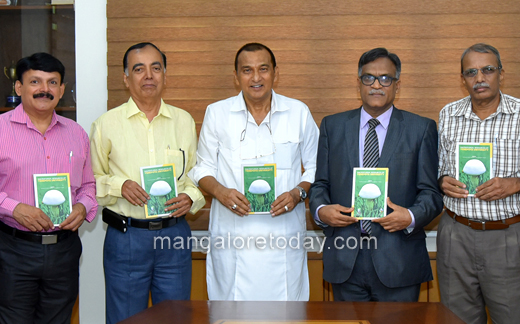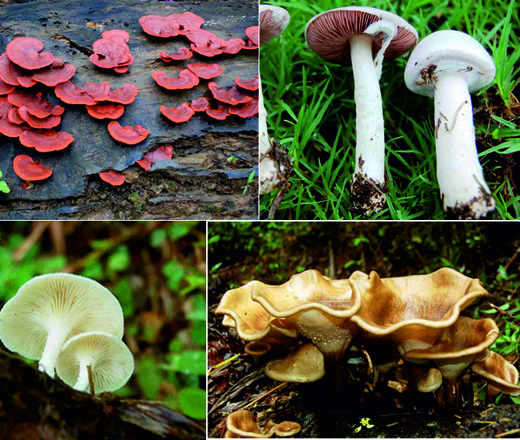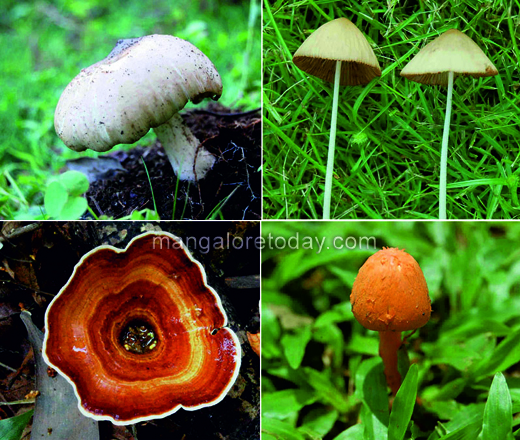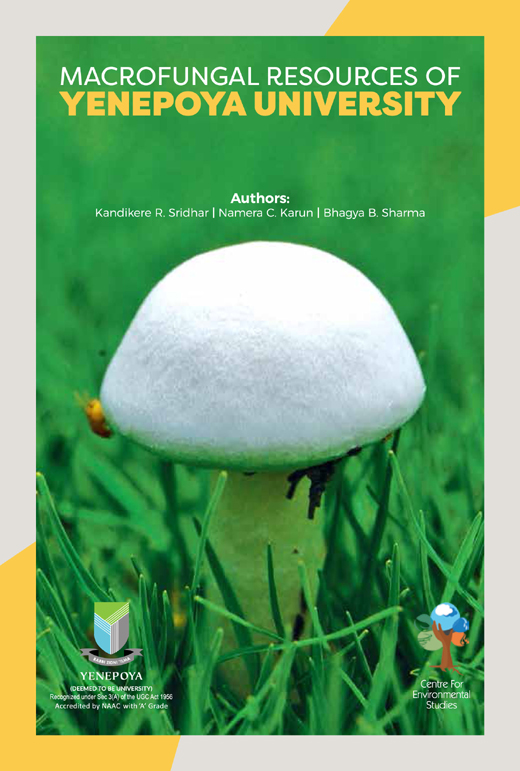Mushrooms of Yenepoya campus documented
Mushrooms of Yenepoya campus documented
Mangalore Today News Network
Mangaluru, May 22, 2018: In a unique initiative, Yenepoya (Deemed to be University) has undertaken a complete mushroom audit of the Derlakatte campus. The study conducted over a period of six months has yielded rich information on the macrofungal resources of the campus. The information has documented in a ready reference book titled ‘Macrofungal Resources of Yenepoya University’. Chancellor Yenepoya Abdullah Kunhi released the book at a ceremony held on the campus on Tuesday, 22 May 2018 in the presence of Vice Chancellor Dr. M. Vijayakumar, Registrar Dr. G. Shreekumar Menon.




Yenepoya is the first educational institution in the region to initiate such a study of mushrooms on the campus. Though mushrooms play a unique role in the ecosystem, importance is always given to only flora and fauna. Yenepoya has initiated other similar studies to document the flora and fauna of the campus too.
The study of macrofungal life on the campus was undertaken by a research team led by Prof. K. R. Sridhar, Dr. N, C, Karun and Dr. Bhagya B. Sharma during June-November 2016. About 60 species of mushrooms have been observed on the campus, out of which about 40 have been described in the book. Out of the 40 species published, 12 species are edible, 12 species are medicinal, two species ectomycorrhizal and one species is parasitic on insects. Two species which are rare and known to be poisonous are also recorded.
The book is dedicated to Prof. M. Abdul Rahiman, former vice chancellor, Kannur and Calicut Universities.
Yenepoya has strived to make its 32 acre campus into an eco-friendly zone. The institution has undertaken various measures for greening the campus with different landscapes like lawns, arboretum, bamboo thickets, medicinal plant garden, areca plantation, acacia groove. The campus includes a large rainwater harvesting pond, roof water harvesting, waste water treatment and recycling plant, vermicompost unit and solar power generation facility. The university carries regular environment audit of the campus and fosters eco club for the students. It is hoped that these activities will inculcate love for nature among the students who study here and inspire them to act as brand ambassadors for nature conservation in the future life.
- Top Maoist leader among at least 29 killed in big Chhattisgarh encounter
- We know what happened...: Supreme court flags ballot voting drawbacks
- Arvind Kejriwal sends "Not a terrorist" message from jail, BJP MP responds
- "You are not innocent": Supreme Court rebukes yoga guru Ramdev again
- Veteran actor Dwarakish passes away
- 4 children dead, 10 missing after boat overturns in Srinagar
- Rupee weakens to record low against US Dollar amid Iran-Israel conflict
- X to charge money from new users for posting, liking and replying to tweets
- Hyderabad: Man burns Lamborghini worth Rs 1 Crore over dispute with owner
- Firing outside Salman Khan’s home: Two arrested from Gujarat
- PM Modi says no one need fear, shares big plans for developed India by 2047
- Rahul Gandhi calls Wayanad "Most beautiful place on earth", wants mother to visit
- FOOTPRINTS 2024 celebrates rich cultures of Northeast India and Tibet at St Joseph’s University
- Hindu rashtra is a myth: Sasikanth Senthil
- Miffed over alliance with BJP, 42 JD(S) office-bearers join Congress party
- Sorake accuses PM Modi of resorting to poll gimmick
- Karnataka stands fifth in recovery of cash
- Changes in train services due to track maintenance works in Palakkad division
- Veteran actor Dwarakish passes away
- Renowned musician K G Jayan passes away
- Local artist’s oil canvas painting reaches PM Modi in Mangaluru road show
- Moodbidri: class 10 student succumbs to brain fever
- Home voting commences for senior citizens, persons with disabilities
- Sowjanya Horata Samithi launches NOTA campaign
- Tulu Paddana kogile Gidigere Ramakka Mugera passes away
- New residential complex for the judges inaugurated in Mangaluru
- Absconding accused nabbed after 8 years
- Truck with cylinders turns turtle in Beltangady
- Bhoota Kola artist dies of cardiac arrest
- Development of the country should be our goal: Ganesh Karnik
- Container truck gets stuck under Modankap railway bridge
- Truck crushes bike’s pillion rider near BC Road
- Head constable dies of heart attack
- Udupi: PDO dismissed over financial irregularities
- CREDAI to resume Skill Development Program for Construction Workers in Mangaluru
- John B Monteiro elected president of Rachana Catholic Chamber of Commerce & Industry
- Sudhanshu Rai elected district president of All College Student Association
- Chief Minister to visit Mangaluru, Udupi on August 1
- Nitte University awards PhD degree to Tina Sheetal D’Souza
- Sachitha Nandagopal honoured by CMTAI for Community Service
- CITY INFORMATION
- TRAVEL
- TOURIST INFORMATION
- HEALTH CARE
- MISCELLANEOUS




 Write Comment
Write Comment E-Mail
E-Mail Facebook
Facebook Twitter
Twitter  Print
Print 

